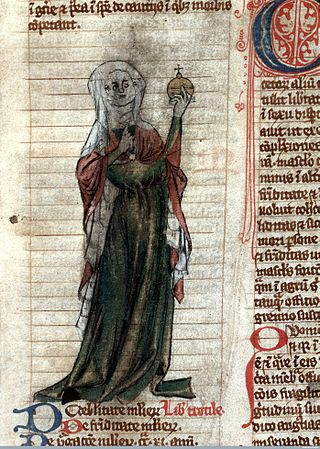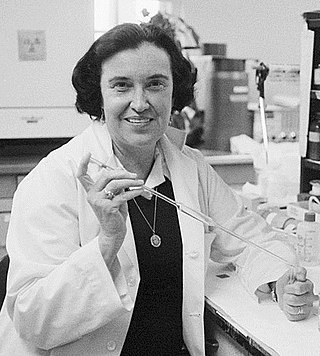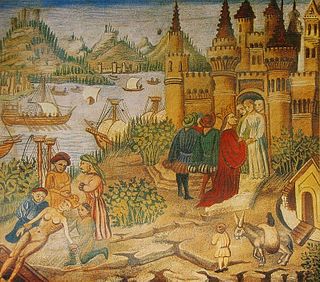Related Research Articles

Bonnie Lynn Bassler is an American molecular biologist; the Squibb Professor in Molecular Biology and chair of the Department of Molecular Biology at Princeton University; and a Howard Hughes Medical Institute Investigator. She has researched cell-to-cell chemical communication in bacteria and discovered key insights into the mechanism by which bacteria communicate, known as quorum sensing. She has contributed to the idea that disruption of chemical signaling can be used as an antimicrobial therapy.

Trotula is a name referring to a group of three texts on women's medicine that were composed in the southern Italian port town of Salerno in the 12th century. The name derives from a historic female figure, Trota of Salerno, a physician and medical writer who was associated with one of the three texts. However, "Trotula" came to be understood as a real person in the Middle Ages and because the so-called Trotula texts circulated widely throughout medieval Europe, from Spain to Poland, and Sicily to Ireland, "Trotula" has historic importance in "her" own right.

Rosalyn Sussman Yalow was an American medical physicist, and a co-winner of the 1977 Nobel Prize in Physiology or Medicine for development of the radioimmunoassay technique. She was the second woman, and the first American-born woman, to be awarded the Nobel Prize in Physiology or Medicine.

Elizabeth Helen Blackburn, is an Australian-American Nobel laureate who is the former president of the Salk Institute for Biological Studies. In 1984, Blackburn co-discovered telomerase, the enzyme that replenishes the telomere, with Carol W. Greider. For this work, she was awarded the 2009 Nobel Prize in Physiology or Medicine, sharing it with Carol W. Greider and Jack W. Szostak, becoming the first Australian woman Nobel laureate.

Philippa "Pippa" Marrack, FRS is an English immunologist and academic, based in the United States, best known for her research and discoveries pertaining to T cells. Marrack is the Ida and Cecil Green Professor and chair of the Department of Biomedical Research at National Jewish Health and a distinguished professor of immunology and microbiology at the University of Colorado Denver.
Margaret Bent CBE, is an English musicologist who specializes in music of the late medieval and Renaissance eras. In particular, she has written extensively on the Old Hall Manuscript, English masses as well as the works of Johannes Ciconia and John Dunstaple.
Gilbertus Anglicus was a medieval English physician. He is known chiefly for his encyclopedic work, the Compendium of Medicine, most probably written between 1230 and 1250. This medical treatise was an attempt at a comprehensive overview of the best practice in pharmacology, medicine, and surgery at the time. His medical works, alongside those of John of Gaddesden, "formed part of the core curriculum that underpinned the practice of medicine for the next 400 years".

Sir Christopher Martin Dobson was a British chemist, who was the John Humphrey Plummer Professor of Chemical and Structural Biology in the Department of Chemistry at the University of Cambridge, and Master of St John's College, Cambridge.
Nancy Jane Kopell is an American mathematician and professor at Boston University. She is co-director of the Center for Computational Neuroscience and Neural Technology (CompNet). She organized and directs the Cognitive Rhythms Collaborative (CRC). Kopell received her B.A. from Cornell University in 1963 and her Ph.D. from Berkeley in 1967. She held visiting positions at the Centre National de la Recherche Scientifique in France (1970), MIT, and the California Institute of Technology (1976).

Lynne Elizabeth Maquat is an American biochemist and molecular biologist whose research focuses on the cellular mechanisms of human disease. She is an elected member of the American Academy of Arts and Sciences, the National Academy of Sciences and the National Academy of Medicine. She currently holds the J. Lowell Orbison Endowed Chair and is a professor of biochemistry and biophysics, pediatrics and of oncology at the University of Rochester Medical Center. Professor Maquat is also Founding Director of the Center for RNA Biology and Founding Chair of Graduate Women in Science at the University of Rochester.

Trota of Salerno was a medical practitioner and writer in the southern Italian coastal town of Salerno who lived in the early or middle decades of the 12th century. Her fame spread as far as France and England in the 12th and 13th centuries. A Latin text that gathered some of her therapies was incorporated into an ensemble of treatises on women's medicine that came to be known as the Trotula, "the little book [called] 'Trotula'". Gradually, readers became unaware that this was the work of three different authors. They were also unaware of name of the historical writer, which was "Trota" and not "Trotula". The latter was thenceforth misunderstood as the author of the whole compendium. These misconceptions about the author of Trotula contributed to the erasure or modification of her name, gender, level of education, medical knowledge, or the time period in which the texts were written; this trend often resulted from the biases of later scholars. Trota's authentic work was forgotten until it was rediscovered in the late 20th century.

Akiko Iwasaki is a Sterling Professor of Immunobiology and Molecular, Cellular and Developmental Biology at Yale University. She is also a principal investigator at the Howard Hughes Medical Institute. Her research interests include innate immunity, autophagy, inflammasomes, sexually transmitted infections, herpes simplex virus, human papillomavirus, respiratory virus infections, influenza infection, T cell immunity, commensal bacteria, COVID-19, and long COVID.
Gagandeep Kang FRS is an Indian microbiologist and virologist who has been leading the work on enteric diseases, diarrheal infections and disease surveillance at the Bill & Melinda Gates Foundation since 2023.
Suman Kumar Dhar is an Indian molecular biologist and a professor at the Special Centre for Molecular Medicine of Jawaharlal Nehru University. He is known for his studies on the DNA replication and cell cycle regulation in Helicobacter pylori and Plasmodium falciparum, two pathogens affecting humans. An elected fellow of the National Academy of Sciences, India, Indian National Science Academy and the Indian Academy of Sciences, he is also a recipient of the National Bioscience Award for Career Development of the Department of Biotechnology in 2010. The Council of Scientific and Industrial Research, the apex agency of the Government of India for scientific research, awarded him the Shanti Swarup Bhatnagar Prize for Science and Technology, one of the highest Indian science awards, in 2012, for his contributions to biological sciences.

This is a timeline of women in science, spanning from ancient history up to the 21st century. While the timeline primarily focuses on women involved with natural sciences such as astronomy, biology, chemistry and physics, it also includes women from the social sciences and the formal sciences, as well as notable science educators and medical scientists. The chronological events listed in the timeline relate to both scientific achievements and gender equality within the sciences.

The women of Salerno, also referred to as the ladies of Salerno and the Salernitan women, were a group of women physicians who studied in medieval Italy, at the Schola Medica Salernitana, one of the first medical schools to allow women.

Sally L. Collins BSc BMBCh DPhil FRCOG is a Professor of Obstetrics in the Nuffield Department of Women’s and Reproductive Health, University of Oxford and a Consultant Obstetrician subspecializing in Feto-Maternal Medicine at the John Radcliffe Hospital, Oxford. She is also a lecturer in Medical Sciences at St. Anne’s College, University of Oxford.
Emilie Savage-Smith is an American-British historian of science known for her work on science in the medieval Islamic world and medicine in the medieval Islamic world.
Gathsaurie Neelika Malavige is a Sri Lankan academic, university professor, researcher and scientist. She is the head as well as the professor at the Department of Immunology and Molecular Sciences of the Sri Jayawardenepura University, Faculty of Medical Sciences since 2020. She is a visiting lecturer at University of Oxford since 2008. She is married to Lasantha Malavige who is regarded as Sri Lanka's first sexologist.
Michelle Asha Albert is an American physician who is the Walter A. Haas Lucie-Stern Endowed Chair in Cardiology and professor of medicine at the University of California, San Francisco. Albert is director of the UCSF Center for the Study of Adversity and Cardiovascular Disease. She is president of the American Heart Association. She served as the president of the Association of Black Cardiologists in 2020–2022 and as president of the Association of University Cardiologists (2021–2022). Albert is an elected member of the National Academy of Medicine, the American Society of Clinical Investigators and the Association of American Physicians.
References
- 1 2 "Monica Green; Faculty bio with extensive links, bibliography". asu.edu. Arizona State University. Retrieved 14 July 2015.
- 1 2 Booher, Bridget (31 March 1996). "Monica Green". Duke Magazine . Retrieved 30 August 2015.
- ↑ Green, Monica Helen (1987). The transmission of ancient theories of female physiology and disease through the early Middle Ages. OCLC 761171518.
- ↑ "Monica H. Green". Radcliffe Institute for Advanced Study at Harvard University. 2012-03-16. Retrieved 2020-02-13.
- ↑ "ACLS American Council of Learned Societies | www.acls.org – Results". www.acls.org. Retrieved 2020-03-10.
- 1 2 "Monica H. Green". Institute for Advanced Study. 9 December 2019. Retrieved 2020-02-13.
- ↑ Graham, Hannah M. "Past Medieval Fellows". www.fordham.edu. Retrieved 2020-04-07.
- ↑ "The Medieval Globe – Arc Humanities Press" . Retrieved 2020-02-14.
- ↑ Guarino, Ben (2018-01-16). "The classic explanation for the Black Death plague is wrong, scientists say". The Washington Post. Retrieved 2020-02-14.
- ↑ Kupferschmidt, Kai (2019-12-30). "Measles may have emerged when large cities rose, 1500 years earlier than thought". Science. Retrieved 2020-02-14.
- ↑ Green, Monica H., The Four Black Deaths , American Historical Review, Volume 125, Issue 5, Oxford Academic, December 17, 2020
- ↑ Perry, David, Did the Black Death Rampage Across the World a Century Earlier Than Previously Thought? , Smithsonian, March 25, 2021
- ↑ "ASU professors' passion for history wins them prestigious fellowships in Berlin". ASU Now: Access, Excellence, Impact. 2015-06-11. Retrieved 2020-02-14.
- ↑ "CARA Awards". Medieval Academy of America. Retrieved 28 March 2018.
- ↑ "Society for Medieval Archaeology 2019 Annual Conference – Humanities Research Centre, The University of York". www.york.ac.uk. Archived from the original on 2020-02-13. Retrieved 2020-02-13.
- ↑ "The Monica H. Green Prize for Distinguished Medieval Research". Medieval Academy of America. Retrieved 12 May 2021.
- ↑ Green, Monica Helen (2008). Making women's medicine masculine : the rise of male authority in pre-modern gynaecology. Oxford: Oxford University Press. ISBN 9780191549526. OCLC 236419788.
- ↑ The Trotula : a medieval compendium of women's medicine. Green, Monica Helen. Philadelphia: University of Pennsylvania Press. 2001. ISBN 058543624X. OCLC 51322175.
{{cite book}}: CS1 maint: others (link)